Moral Responsibility and Halting Global Warming: An Ethical Analysis
VerifiedAdded on 2023/01/17
|5
|1298
|42
Essay
AI Summary
This essay addresses the critical issue of global warming and the moral responsibility humans bear in mitigating its effects. The author argues that humans are primarily responsible for climate change due to greenhouse gas emissions and the direct relationship between individual actions and environmental impact. The essay delves into ethical considerations, emphasizing the importance of climate justice and the harmful consequences of inaction. It explains the scientific basis of global warming, including the role of carbon dioxide and other pollutants in trapping heat, and highlights the rising global temperatures and extreme weather events. The essay also explores the concept of moral responsibility, emphasizing the need for collective action and individual contributions to address the problem, including the use of rhetorical devices to persuade the audience about the importance of this issue. The author references several studies and data from NASA to support the claims, emphasizing the urgency of addressing global warming and the need for a collective effort to bring about positive change.
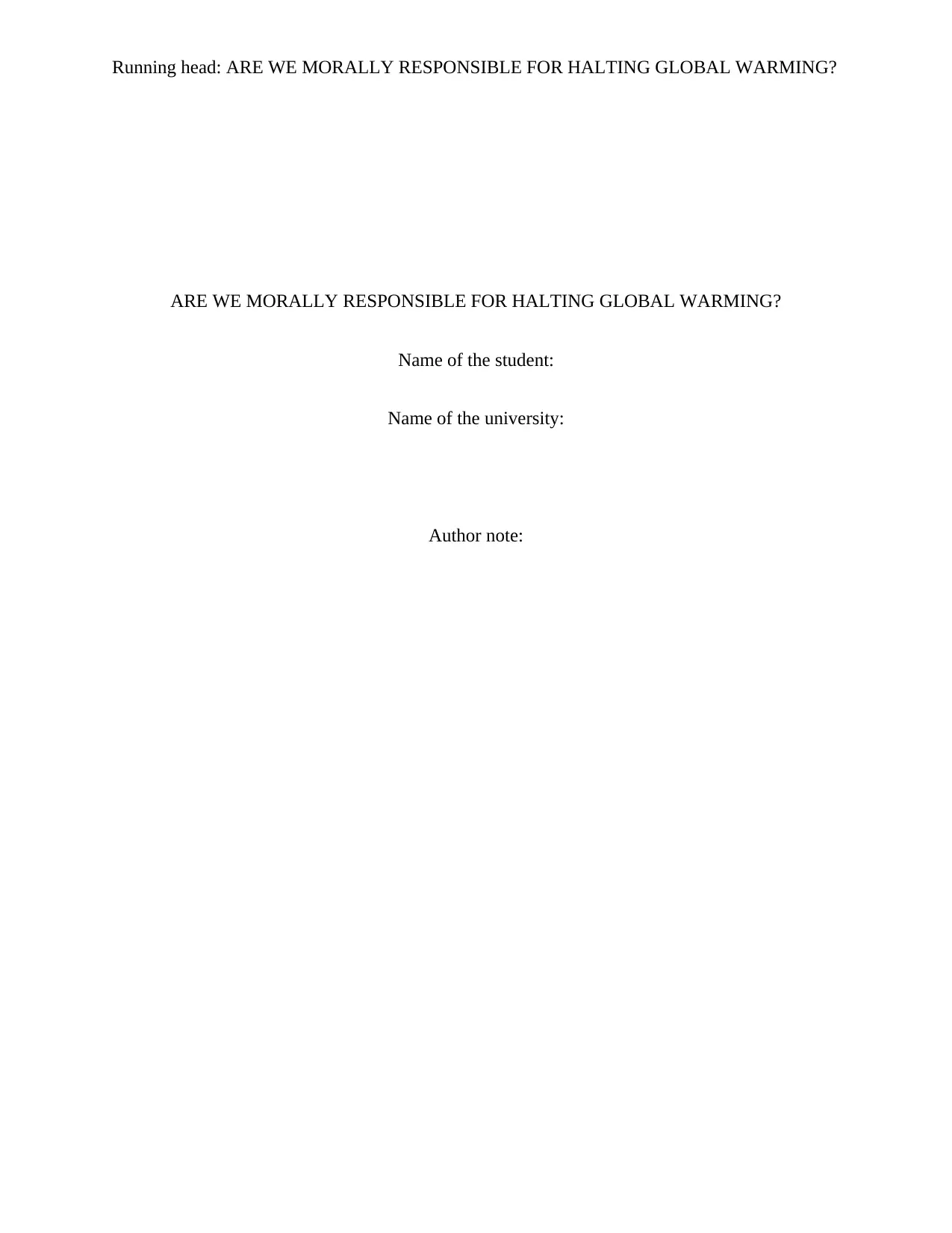
Running head: ARE WE MORALLY RESPONSIBLE FOR HALTING GLOBAL WARMING?
ARE WE MORALLY RESPONSIBLE FOR HALTING GLOBAL WARMING?
Name of the student:
Name of the university:
Author note:
ARE WE MORALLY RESPONSIBLE FOR HALTING GLOBAL WARMING?
Name of the student:
Name of the university:
Author note:
Paraphrase This Document
Need a fresh take? Get an instant paraphrase of this document with our AI Paraphraser
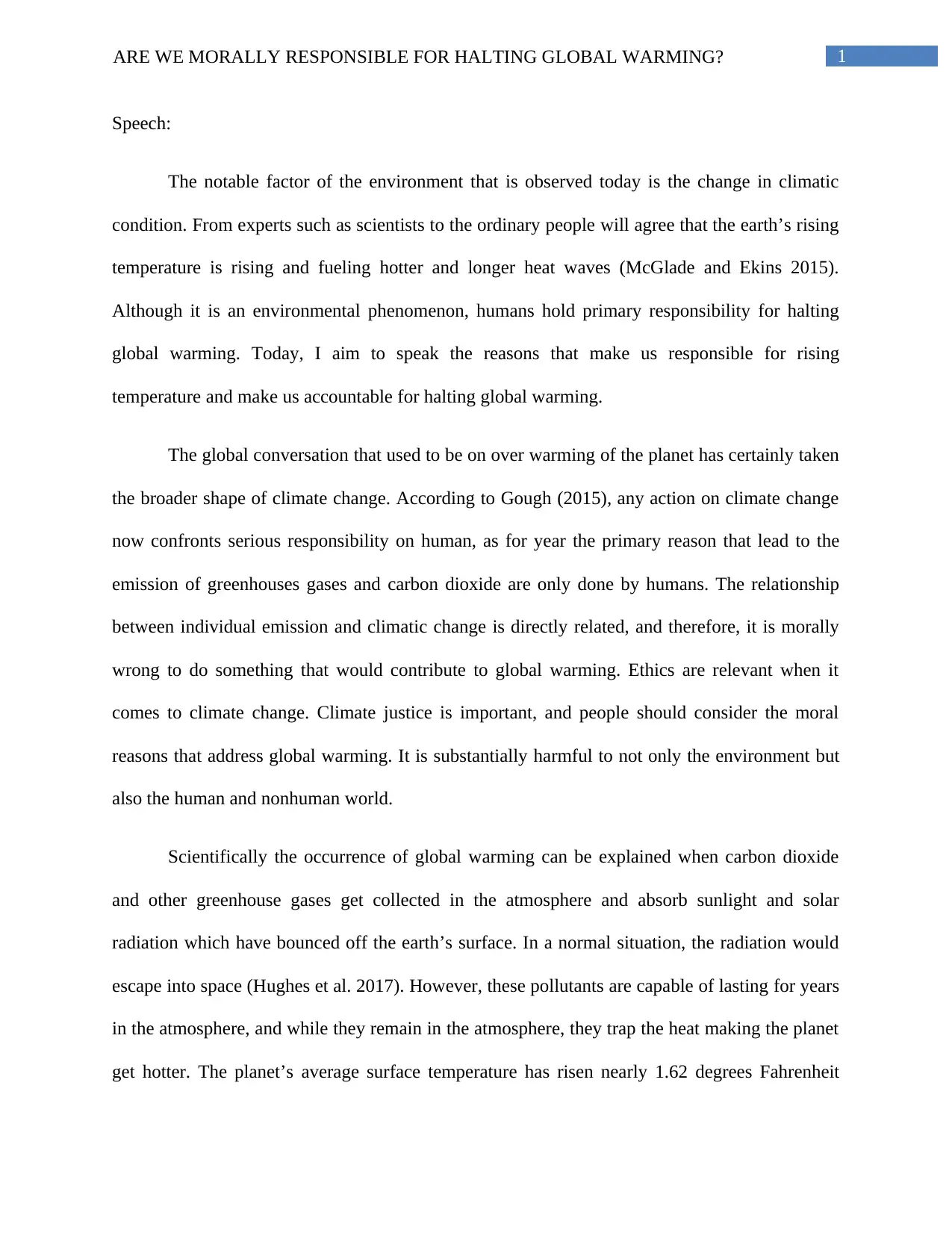
1ARE WE MORALLY RESPONSIBLE FOR HALTING GLOBAL WARMING?
Speech:
The notable factor of the environment that is observed today is the change in climatic
condition. From experts such as scientists to the ordinary people will agree that the earth’s rising
temperature is rising and fueling hotter and longer heat waves (McGlade and Ekins 2015).
Although it is an environmental phenomenon, humans hold primary responsibility for halting
global warming. Today, I aim to speak the reasons that make us responsible for rising
temperature and make us accountable for halting global warming.
The global conversation that used to be on over warming of the planet has certainly taken
the broader shape of climate change. According to Gough (2015), any action on climate change
now confronts serious responsibility on human, as for year the primary reason that lead to the
emission of greenhouses gases and carbon dioxide are only done by humans. The relationship
between individual emission and climatic change is directly related, and therefore, it is morally
wrong to do something that would contribute to global warming. Ethics are relevant when it
comes to climate change. Climate justice is important, and people should consider the moral
reasons that address global warming. It is substantially harmful to not only the environment but
also the human and nonhuman world.
Scientifically the occurrence of global warming can be explained when carbon dioxide
and other greenhouse gases get collected in the atmosphere and absorb sunlight and solar
radiation which have bounced off the earth’s surface. In a normal situation, the radiation would
escape into space (Hughes et al. 2017). However, these pollutants are capable of lasting for years
in the atmosphere, and while they remain in the atmosphere, they trap the heat making the planet
get hotter. The planet’s average surface temperature has risen nearly 1.62 degrees Fahrenheit
Speech:
The notable factor of the environment that is observed today is the change in climatic
condition. From experts such as scientists to the ordinary people will agree that the earth’s rising
temperature is rising and fueling hotter and longer heat waves (McGlade and Ekins 2015).
Although it is an environmental phenomenon, humans hold primary responsibility for halting
global warming. Today, I aim to speak the reasons that make us responsible for rising
temperature and make us accountable for halting global warming.
The global conversation that used to be on over warming of the planet has certainly taken
the broader shape of climate change. According to Gough (2015), any action on climate change
now confronts serious responsibility on human, as for year the primary reason that lead to the
emission of greenhouses gases and carbon dioxide are only done by humans. The relationship
between individual emission and climatic change is directly related, and therefore, it is morally
wrong to do something that would contribute to global warming. Ethics are relevant when it
comes to climate change. Climate justice is important, and people should consider the moral
reasons that address global warming. It is substantially harmful to not only the environment but
also the human and nonhuman world.
Scientifically the occurrence of global warming can be explained when carbon dioxide
and other greenhouse gases get collected in the atmosphere and absorb sunlight and solar
radiation which have bounced off the earth’s surface. In a normal situation, the radiation would
escape into space (Hughes et al. 2017). However, these pollutants are capable of lasting for years
in the atmosphere, and while they remain in the atmosphere, they trap the heat making the planet
get hotter. The planet’s average surface temperature has risen nearly 1.62 degrees Fahrenheit
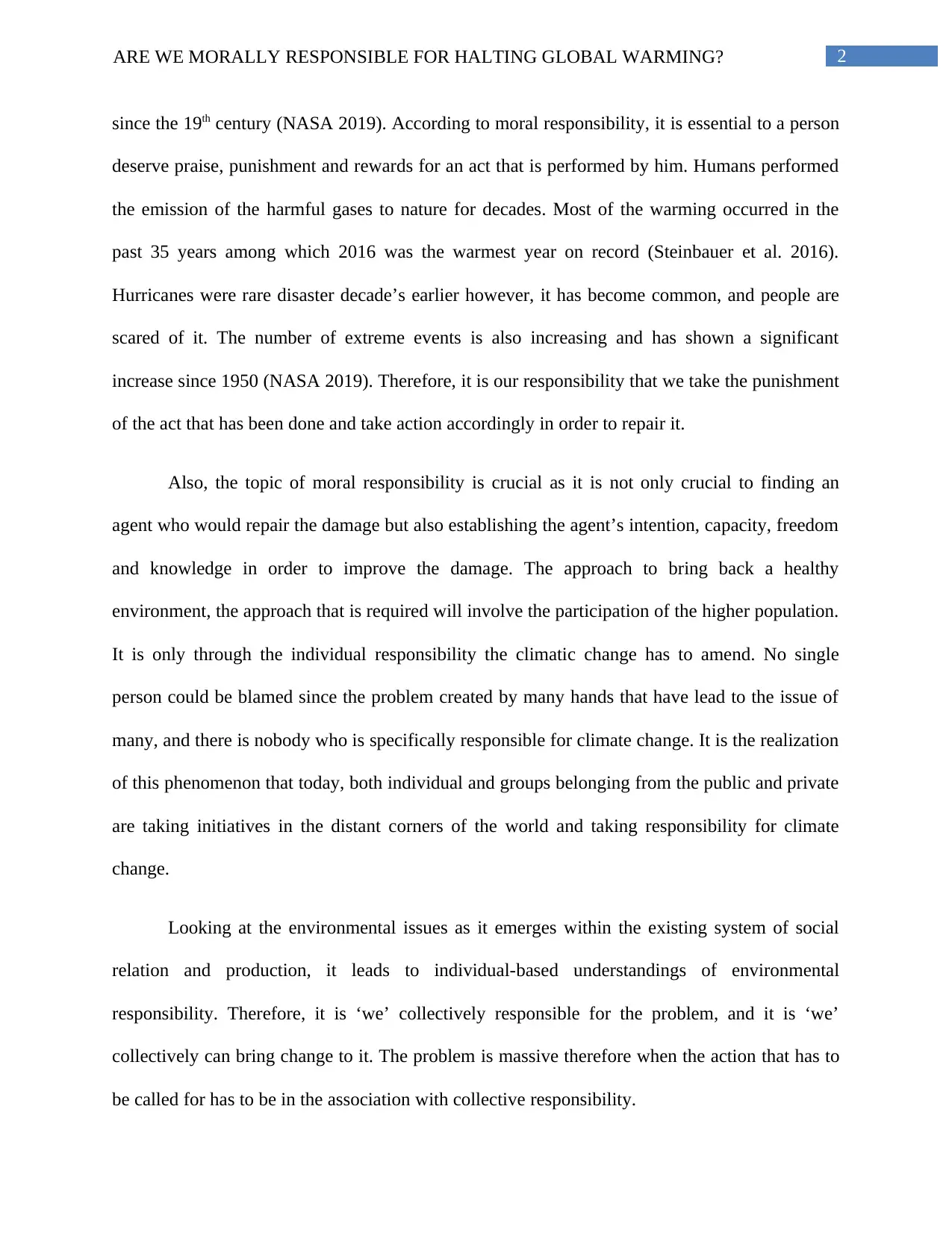
2ARE WE MORALLY RESPONSIBLE FOR HALTING GLOBAL WARMING?
since the 19th century (NASA 2019). According to moral responsibility, it is essential to a person
deserve praise, punishment and rewards for an act that is performed by him. Humans performed
the emission of the harmful gases to nature for decades. Most of the warming occurred in the
past 35 years among which 2016 was the warmest year on record (Steinbauer et al. 2016).
Hurricanes were rare disaster decade’s earlier however, it has become common, and people are
scared of it. The number of extreme events is also increasing and has shown a significant
increase since 1950 (NASA 2019). Therefore, it is our responsibility that we take the punishment
of the act that has been done and take action accordingly in order to repair it.
Also, the topic of moral responsibility is crucial as it is not only crucial to finding an
agent who would repair the damage but also establishing the agent’s intention, capacity, freedom
and knowledge in order to improve the damage. The approach to bring back a healthy
environment, the approach that is required will involve the participation of the higher population.
It is only through the individual responsibility the climatic change has to amend. No single
person could be blamed since the problem created by many hands that have lead to the issue of
many, and there is nobody who is specifically responsible for climate change. It is the realization
of this phenomenon that today, both individual and groups belonging from the public and private
are taking initiatives in the distant corners of the world and taking responsibility for climate
change.
Looking at the environmental issues as it emerges within the existing system of social
relation and production, it leads to individual-based understandings of environmental
responsibility. Therefore, it is ‘we’ collectively responsible for the problem, and it is ‘we’
collectively can bring change to it. The problem is massive therefore when the action that has to
be called for has to be in the association with collective responsibility.
since the 19th century (NASA 2019). According to moral responsibility, it is essential to a person
deserve praise, punishment and rewards for an act that is performed by him. Humans performed
the emission of the harmful gases to nature for decades. Most of the warming occurred in the
past 35 years among which 2016 was the warmest year on record (Steinbauer et al. 2016).
Hurricanes were rare disaster decade’s earlier however, it has become common, and people are
scared of it. The number of extreme events is also increasing and has shown a significant
increase since 1950 (NASA 2019). Therefore, it is our responsibility that we take the punishment
of the act that has been done and take action accordingly in order to repair it.
Also, the topic of moral responsibility is crucial as it is not only crucial to finding an
agent who would repair the damage but also establishing the agent’s intention, capacity, freedom
and knowledge in order to improve the damage. The approach to bring back a healthy
environment, the approach that is required will involve the participation of the higher population.
It is only through the individual responsibility the climatic change has to amend. No single
person could be blamed since the problem created by many hands that have lead to the issue of
many, and there is nobody who is specifically responsible for climate change. It is the realization
of this phenomenon that today, both individual and groups belonging from the public and private
are taking initiatives in the distant corners of the world and taking responsibility for climate
change.
Looking at the environmental issues as it emerges within the existing system of social
relation and production, it leads to individual-based understandings of environmental
responsibility. Therefore, it is ‘we’ collectively responsible for the problem, and it is ‘we’
collectively can bring change to it. The problem is massive therefore when the action that has to
be called for has to be in the association with collective responsibility.
⊘ This is a preview!⊘
Do you want full access?
Subscribe today to unlock all pages.

Trusted by 1+ million students worldwide
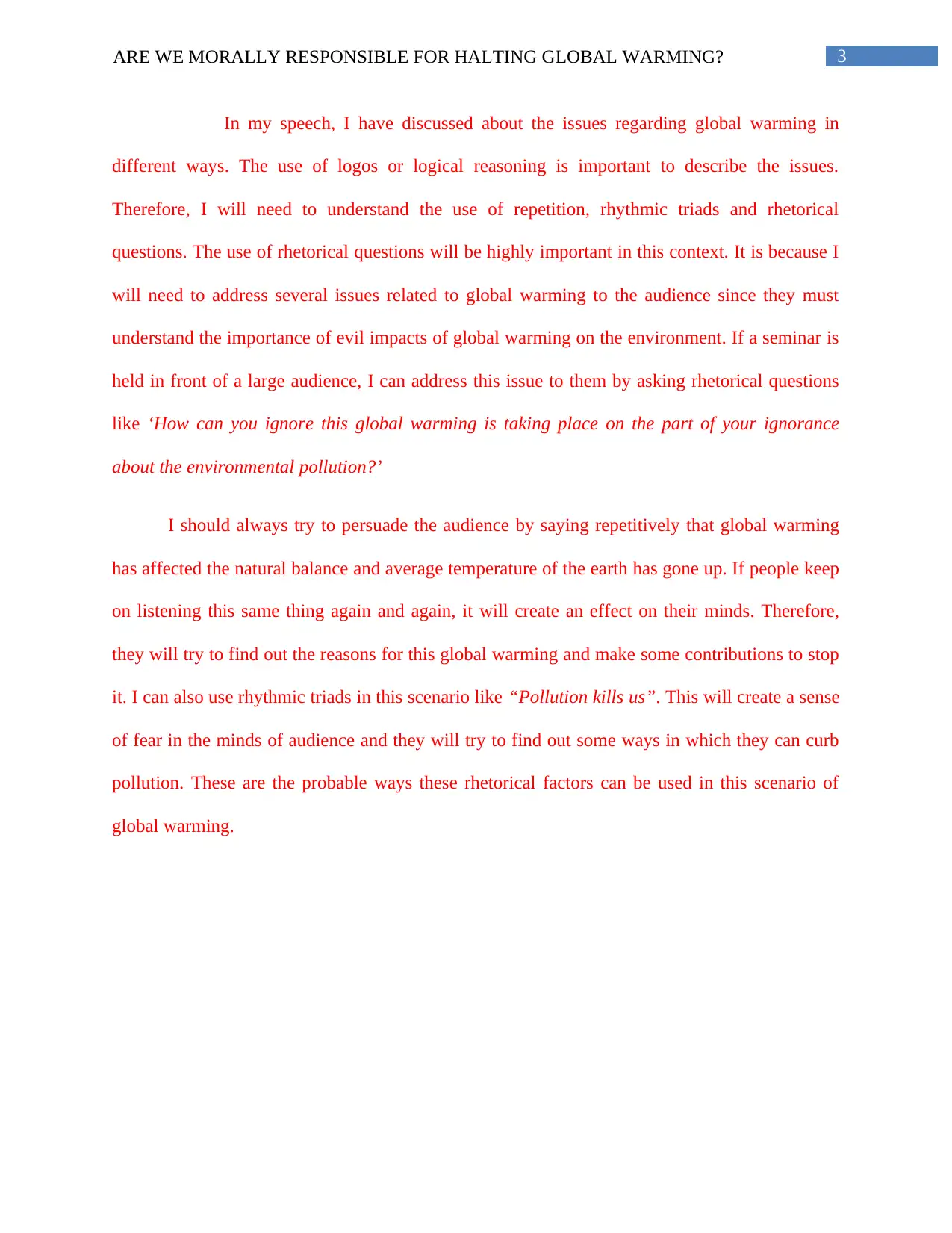
3ARE WE MORALLY RESPONSIBLE FOR HALTING GLOBAL WARMING?
In my speech, I have discussed about the issues regarding global warming in
different ways. The use of logos or logical reasoning is important to describe the issues.
Therefore, I will need to understand the use of repetition, rhythmic triads and rhetorical
questions. The use of rhetorical questions will be highly important in this context. It is because I
will need to address several issues related to global warming to the audience since they must
understand the importance of evil impacts of global warming on the environment. If a seminar is
held in front of a large audience, I can address this issue to them by asking rhetorical questions
like ‘How can you ignore this global warming is taking place on the part of your ignorance
about the environmental pollution?’
I should always try to persuade the audience by saying repetitively that global warming
has affected the natural balance and average temperature of the earth has gone up. If people keep
on listening this same thing again and again, it will create an effect on their minds. Therefore,
they will try to find out the reasons for this global warming and make some contributions to stop
it. I can also use rhythmic triads in this scenario like “Pollution kills us”. This will create a sense
of fear in the minds of audience and they will try to find out some ways in which they can curb
pollution. These are the probable ways these rhetorical factors can be used in this scenario of
global warming.
In my speech, I have discussed about the issues regarding global warming in
different ways. The use of logos or logical reasoning is important to describe the issues.
Therefore, I will need to understand the use of repetition, rhythmic triads and rhetorical
questions. The use of rhetorical questions will be highly important in this context. It is because I
will need to address several issues related to global warming to the audience since they must
understand the importance of evil impacts of global warming on the environment. If a seminar is
held in front of a large audience, I can address this issue to them by asking rhetorical questions
like ‘How can you ignore this global warming is taking place on the part of your ignorance
about the environmental pollution?’
I should always try to persuade the audience by saying repetitively that global warming
has affected the natural balance and average temperature of the earth has gone up. If people keep
on listening this same thing again and again, it will create an effect on their minds. Therefore,
they will try to find out the reasons for this global warming and make some contributions to stop
it. I can also use rhythmic triads in this scenario like “Pollution kills us”. This will create a sense
of fear in the minds of audience and they will try to find out some ways in which they can curb
pollution. These are the probable ways these rhetorical factors can be used in this scenario of
global warming.
Paraphrase This Document
Need a fresh take? Get an instant paraphrase of this document with our AI Paraphraser
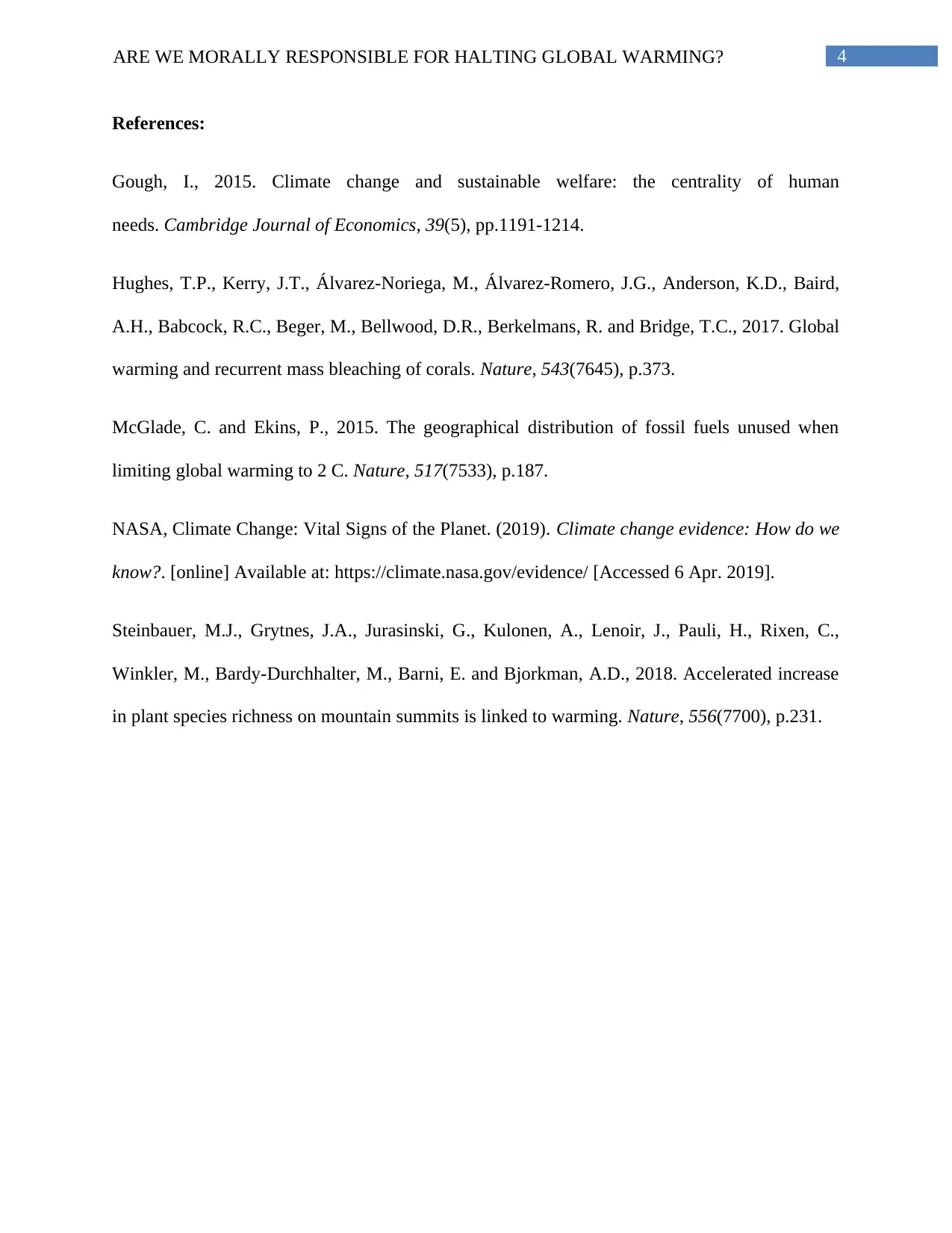
4ARE WE MORALLY RESPONSIBLE FOR HALTING GLOBAL WARMING?
References:
Gough, I., 2015. Climate change and sustainable welfare: the centrality of human
needs. Cambridge Journal of Economics, 39(5), pp.1191-1214.
Hughes, T.P., Kerry, J.T., Álvarez-Noriega, M., Álvarez-Romero, J.G., Anderson, K.D., Baird,
A.H., Babcock, R.C., Beger, M., Bellwood, D.R., Berkelmans, R. and Bridge, T.C., 2017. Global
warming and recurrent mass bleaching of corals. Nature, 543(7645), p.373.
McGlade, C. and Ekins, P., 2015. The geographical distribution of fossil fuels unused when
limiting global warming to 2 C. Nature, 517(7533), p.187.
NASA, Climate Change: Vital Signs of the Planet. (2019). Climate change evidence: How do we
know?. [online] Available at: https://climate.nasa.gov/evidence/ [Accessed 6 Apr. 2019].
Steinbauer, M.J., Grytnes, J.A., Jurasinski, G., Kulonen, A., Lenoir, J., Pauli, H., Rixen, C.,
Winkler, M., Bardy-Durchhalter, M., Barni, E. and Bjorkman, A.D., 2018. Accelerated increase
in plant species richness on mountain summits is linked to warming. Nature, 556(7700), p.231.
References:
Gough, I., 2015. Climate change and sustainable welfare: the centrality of human
needs. Cambridge Journal of Economics, 39(5), pp.1191-1214.
Hughes, T.P., Kerry, J.T., Álvarez-Noriega, M., Álvarez-Romero, J.G., Anderson, K.D., Baird,
A.H., Babcock, R.C., Beger, M., Bellwood, D.R., Berkelmans, R. and Bridge, T.C., 2017. Global
warming and recurrent mass bleaching of corals. Nature, 543(7645), p.373.
McGlade, C. and Ekins, P., 2015. The geographical distribution of fossil fuels unused when
limiting global warming to 2 C. Nature, 517(7533), p.187.
NASA, Climate Change: Vital Signs of the Planet. (2019). Climate change evidence: How do we
know?. [online] Available at: https://climate.nasa.gov/evidence/ [Accessed 6 Apr. 2019].
Steinbauer, M.J., Grytnes, J.A., Jurasinski, G., Kulonen, A., Lenoir, J., Pauli, H., Rixen, C.,
Winkler, M., Bardy-Durchhalter, M., Barni, E. and Bjorkman, A.D., 2018. Accelerated increase
in plant species richness on mountain summits is linked to warming. Nature, 556(7700), p.231.
1 out of 5
Related Documents
Your All-in-One AI-Powered Toolkit for Academic Success.
+13062052269
info@desklib.com
Available 24*7 on WhatsApp / Email
![[object Object]](/_next/static/media/star-bottom.7253800d.svg)
Unlock your academic potential
Copyright © 2020–2026 A2Z Services. All Rights Reserved. Developed and managed by ZUCOL.





